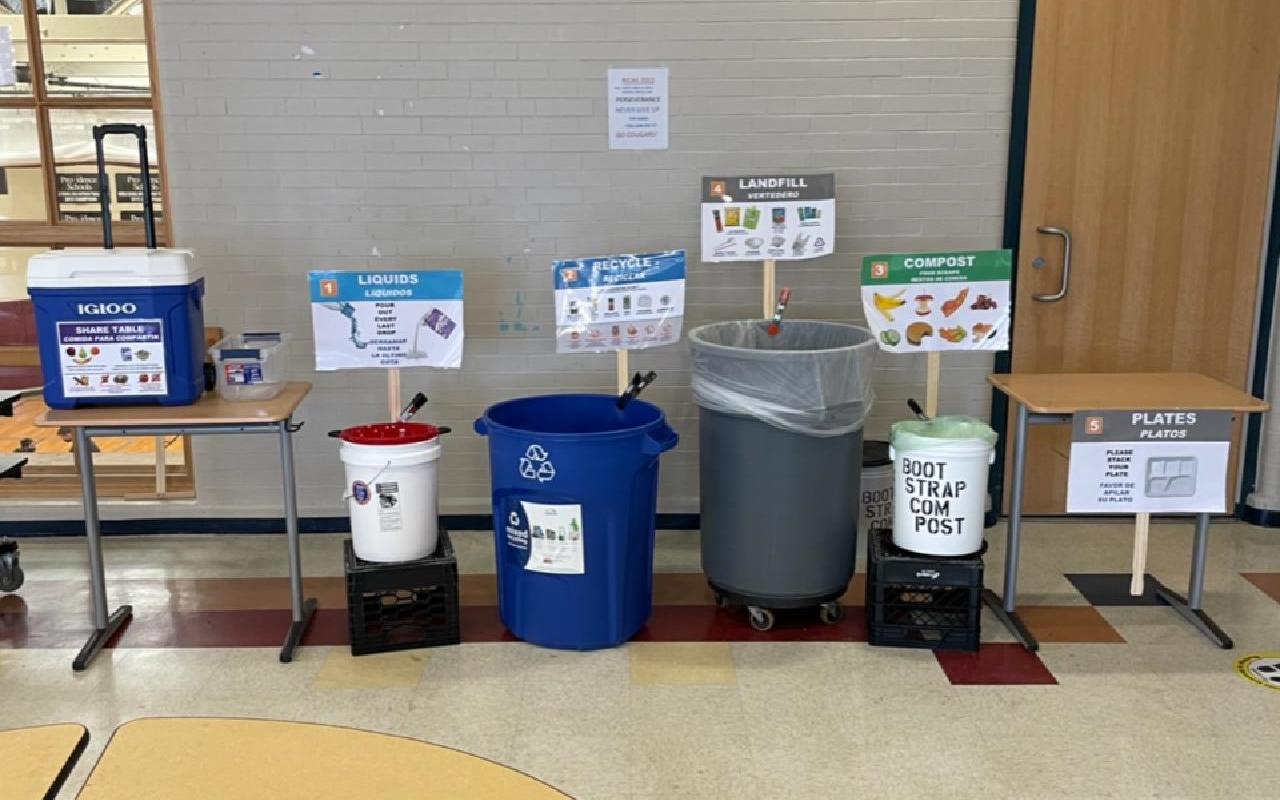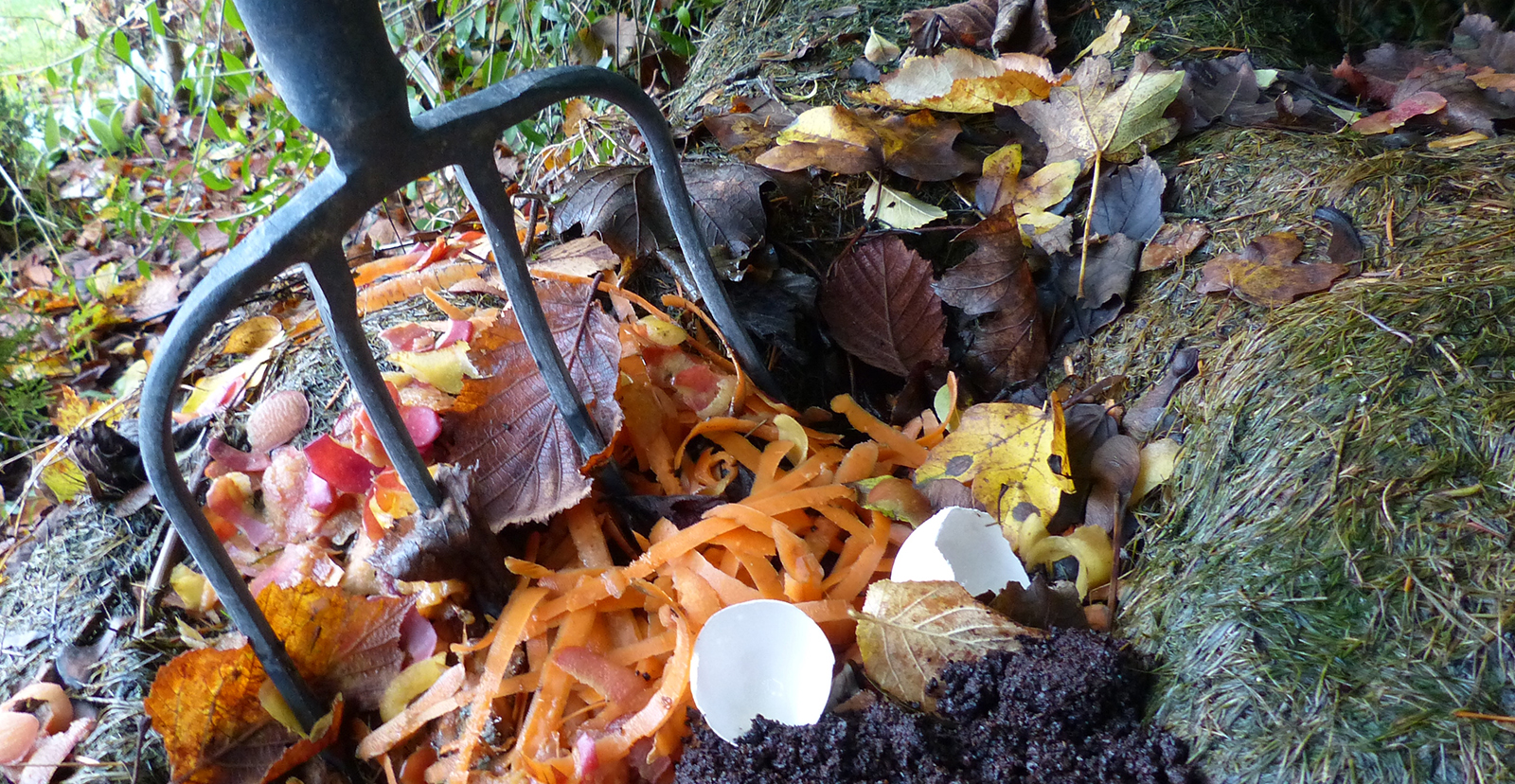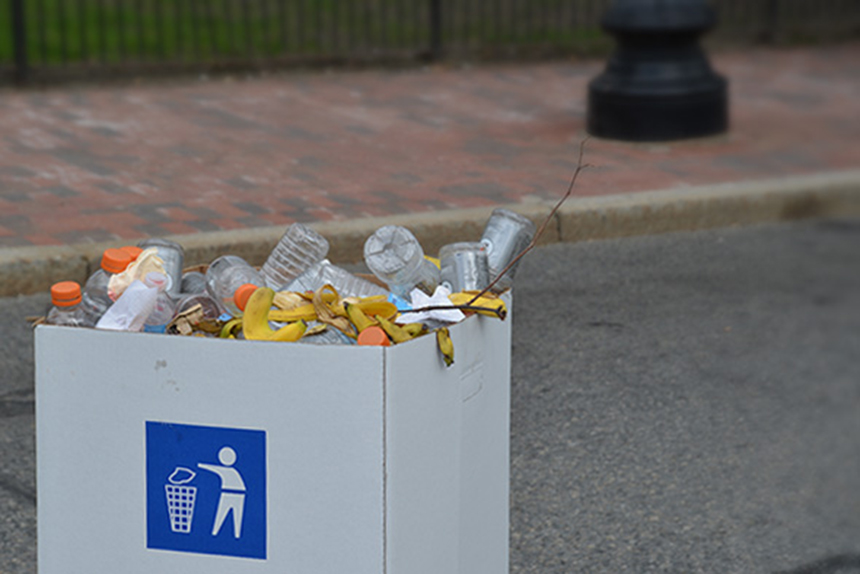High School Students On Mission to Increase School Composting, Reduce Food Waste
May 2, 2024
When Bella Quiroa and Emma Pautz realized their high schools were severely lacking in composting infrastructure and enthusiasm, despite a 2021 law mandating that Rhode Island schools reduce food waste, they decided to do something about it.
Quiroa, 17, a junior at the East Bay MET School in Newport, and Pautz, also 17 and a junior at Barrington High School, formed the Youth Composting Campaign Initiative (YCCI) “with a goal of reaching superintendents and government agencies to implement cafeteria composting programs in more R.I. schools.”
“Our Central Landfill is set to be at capacity by 2043, and food waste is contributing to 24% of the landfill’s total waste,” they wrote in an email to ecoRI News. “Of that large percentage, a staggering 5,000,000 pounds of food waste is coming from our K-12 schools annually.”


The YCCI is “working directly with school communities, uplifting student voices, and collaborating with environmental organizations” to improve schools’ lunchroom composting and food donations as required under state law, which applies to schools that produce at least 30 tons of organic waste annually or are within 15 miles of a composting or anaerobic digester facility with the capacity to accept such waste.
The legislation, which took effect Sept. 1, 2021, requires schools to produce a “waste audit” report with guidelines and strategies meant to eliminate food waste, promote recycling, and provide excess food to their communities.
The law also requires school districts’ food-service companies to seek contracts to comply with relevant recycling and compositing laws, and districts are encouraged to use vendors buying 10% of their supplies from Rhode Island-based companies, with a requirement for the companies to donate unserved nonperishable or unspoiled perishable food to local food banks.
But the law is ultimately an unfunded mandate, as the state provided no additional funding to schools to comply. And hauling trash isn’t cheap. Compliance expenses could cost a small elementary school about $2,500, and around $4,000 for a large middle school, according to estimates.
“Unfortunately, two years after the introduction of this mandate, there has been little success,” Pautz and Quiroa said.
In addition to starting the YCCI, the students created a questionnaire and sent it to educators and administrators at more than 280 schools to find out the state of their composting efforts.
The survey questions “covered a wide range of topics, including the presence and strength of composting programs, awareness of composting mandates, perceived difficulties in implementation and maintenance, level of administrative support, community affluence, and available resources,” according to a 24-page report Pautz and Quiroa wrote about their findings.
The results were disappointing: of the 88 schools that responded to the survey, 64% were not aware of the law, and 67% of respondents’ schools did not have a composting program.
“Overall, the analysis of general results demonstrates the importance of concerted efforts to promote composting initiatives across all levels of education in Rhode Island,” according to Pautz and Quiroa’s report.
Composting challenges
Most survey respondents represented elementary schools, comprising 42%, followed by high schools, at 31%, middle or junior high schools, at 21%, and K-12 schools at 5%.
Eighty-two percent of the high schools that responded had not heard of the law, according to the report, while 54% of elementary schools, 60% of middle/junior high schools, and 50% of K-12 schools were unaware of the mandate.
Eighty-five percent of responding high schools did not have composting programs in their cafeterias, while 60% of elementary schools and 65% of middle/junior high schools did not compost.
The report points out the correlation between awareness of the state law and the implementation of composting programs. Of the schools that do not compost, 76% were unaware of the mandate.
In the schools that did compost, responses varied on whether or not the programs were successful in terms of student engagement. Twenty-seven percent of respondents said their programs were “strong,” 13% said “very strong,” and 14% described their programs as “not strong.”
Unsurprisingly, schools in wealthier communities were more likely to have composting programs, with 31% of respondents with composting programs describing their communities as “affluent” and 17% as “very affluent,” while 27% and 20% of non-composting schools describing their communities as “not affluent” and “not affluent at all,” respectively.
Respondents’ answers to the question “If you have not started composting in your school, could you explain why?” highlight the roadblocks to implementing composting programs:
“Limited resources and support, higher priorities in a struggling school. We don’t even have recycling.”
“Lack of support and resources.”
“No time or resources or students who want to start it.”
“No plan or funding allocated.”
“Lack of staff/space to separate compostable material in the cafeteria.”
“Requires teacher’s time, [which] teachers do not have. [We] barely have enough teachers for coverages.”
“Addressing these challenges will require support, resources, and enforcement to facilitate the successful implementation and long-term sustainability of composting programs in schools,” the report found.
“Overall, the findings demonstrate the importance of efforts to promote composting initiatives in Rhode Island schools, address implementation challenges, and ensure equitable access to composting. By providing support and resources and creating enforcement mechanisms, schools can be more apt to follow the composting mandates set forth by the state,” the report concluded.
Making a difference
That’s where Pautz and Quiroa come in. They’ve created a petition to raise awareness of the state mandate and to get stakeholders involved.
“We are currently at about 1,000 signatures, but we hope to gain much more before we demand action” from school superintendents, the state Department of Environmental Protection and the state attorney general, Pautz said.
Pautz has been involved with environmental causes since middle school, when she met with her principal to ask that the school become more environmentally conscious. She was intern with Clean Ocean Access, helped organize the Rhode Island Compost Conference and Trade Show, and is a member of the Advocacy Project.
Quiroa, a former Clean Ocean Access intern, has made two presentations in Barrington about environmentalism and composting, and donated 5-gallon buckets to families so they could start composting at home.
The two were both passionate and thoughtful when discussing their composting efforts on a recent Zoom call.
Noting that the state’s only landfill will likely have to close by 2043, “we’re going to have to transport waste to neighboring states, or build or expand on our landfill, which is obviously going to cost a lot and be a logistical issue,” Pautz said.
“Considering that schools are producing a lot of food waste through their lunchrooms, it’s really important to get composting systems into lunchrooms,” Quiroa said.
Pautz and Quiroa said they think schools’ composting efforts need buy-in from both students and administrators to be successful.
“Some students do compost during lunch. And they’re able to properly put their fruits and vegetables in the compost bin,” Pautz said. “But we should be having more students [compost]. When you only have one or two people doing it, then you’re not going to be able to get as much compost as you should. And so, obviously, we need more people to be involved. But I think that it also needs to come from administration, and administration is not going to do anything if it’s not being enforced.”
They’ve received support from students they’ve spoken to, they said.

“We have gotten a lot of support through students across Rhode Island, students have signed our petition, and spread the word about our petition, which we’re very grateful for,” Pautz said. “But getting more people involved is really important.”
They also want to highlight the part of the mandate that requires schools to donate unperishable or unspoiled perishable food to local food banks.
According to an estimate from the Rhode Island Schools Recycling Club, an Environmental Protection Agency grant-funded program dedicated to reducing school waste, schools could recover 388 tons of safe-to-eat food for hungry students or food pantries annually. That includes unopened milk and yogurt, cheese, whole fruit, and granola bars.
In a state where 1 in 6 residents and 1 in 4 families with children are food insecure, the waste is both literal and figurative.
A study by the Recycling Club in 2019 showed the average weight of lunches in elementary, middle, and high schools was 1.1 pounds, meaning a 6- or 7-year-old in first grade was being served the same amount of food as a teenager.
Elementary schools will generate 47 pounds of food waste per student annually. Middle schools will generate 39 pounds of waste per student, and high schools generate the least, at 15.6 pounds per student.
The 2021 law requires each educational entity to donate any unserved nonperishable food or unspoiled perishable food to local food pantries or the Rhode Island Community Food Bank.
“It’s really important to us to really focus on the food donation aspect,” Quiroa said.
Recycling Club co-director Jim Corwin said his program has diverted from the landfill “13 tons of perfectly good food, the equivalent of 260,000 meals.” His organization has reduced school food waste by 30%, he said, and the goal is to get to 50% by 2030.
He said the main hesitation when it comes to composting in schools is “who’s going to do it. Everyone’s got 1,000 things to do. So we do the heavy lifting, schedule field trips, buy the recycling bins.”
He’s working with Pautz and Quiroa on their project and described them as “great kids.”
“They’re doing great work,” he said. “They got the runaround when they tried to start composting at their schools. They said they weren’t going to wait around for the adults. Nobody else is going to do this.
“They’re learning about laws, and that even though a law gets signed, sometimes it doesn’t get enacted,” Corwin said.
Pautz, who admitted to being “a stickler for rules,” said she’s frustrated that policymakers, state officials, and stakeholders are lax about enforcing the law.
“It [is]a law, and that means that politicians have to make sure it’s actually working, and it’s actually being complied with, which we found it hasn’t,” she said. “And so we’re hoping politicians can realize, and administrators can realize, that this is a big issue and it’s the law is not being followed.”
To sign the petition to support composting in schools, click here.




People in RI have been actively advocating for compost since 2009. Still moving forward thanks to the School Recycling project and young folks like Emma and Bella.